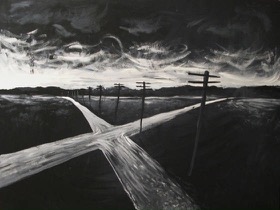Crossroads

Wisteria was blooming in the woodlands we passed, and azaleas and dogwoods, too; April all dressed up like the middle of May. I expected blistering poverty, and the typical shotgun house might look like a shack anywhere else, but they’re common here; an old tradition, a familiar adaptation to the climate and the land. It all looked alluring on this Spring afternoon.
We’d spent the morning tracking down a shirttail ancestor who’d been buried in the Vicksburg National Cemetery. Part of U. S. Grant’s bold brigades that opened up the Mississippi in 1863, breaking the Confederacy’s backbone; brought low by disease, he’d fought at Jackson and in those three awful assaults on the impregnable Rebel breastworks surrounding the town. Lester Seward was important in my family’s story because his death curiously enabled my family to happen.
His brother and sister-in-law had died of the cholera in the Texas Hill Country a few years before, leaving two young daughters. As was the custom then, those daughters ceded to their uncle’s care, and were shipped up to Illinois where Lester lived. But Lester entered the Union Army, whether conscripted or attracted by the recruiting bonus, he was shipped off to Vicksburg and didn’t return.
Fifteen that late summer of 1863, my great great grandmother fell in love with a recently mustered young bluejacket who’d marched two days barefoot in the snow the previous October, contracting rheumatic fever and declared unfit for duty without ever firing a shot in anger. Lester’s widow probably gratefully signed the consent, and Maria and her true love headed for Oregon (where the weather was said to be favorable for his condition) on horseback, Maria’s thirteen year old sister in tow. So you see, Lester dying facilitated my being. I felt compelled to stop and say thanks and, you know, sorry.
We found the simple marble headstone situated beneath an ancient magnolia on the bluff overlooking the muddy river that had previously held rebel naval batteries. Most of the graves there were for unknowns, but I doubt any family was untouched by the great calamities that led to those internments. Boys marching away, never to come back, do not simply disappear, but seem to echo through subsequent history, sometimes conspicuous by the very fact of their absence.
I suppose we are each sometimes conspicuous in our absence, not merely a hole in the ranks but a glaring omission stumbling the whole formation. None of us could ever know.
The Muse had chosen our route after sampling several others, arguing with herself over whether this one was too rural, and we discussed whether we should just abandon our backwards backroad intention and hop the ubiquitous Interstate and trade experience for speed. We were in no particular hurry to end the excursion, the timeless portion of our traveling, so we stuck with the two lane again.
Lunch looked problematic. These backroads have more salvation and eternal damnation signs than restaurants, and the slow drive through two little towns revealed nothing resembling a food stop. We tried one gas station that promised a deli, but it featured nothing more eatable than deep fried previously frozen pizza sticks and over-breaded chicken livers. We finally found something authentic, a family restaurant serving plate lunches—choice of two entrees and three sides, and were served a fine plate of red beans and sausage over rice, turnip greens, and purple skinned peas; apple cobbler for dessert. More food than we might eat in two meals for the price of about half of one.
The Muse dozed under the lunch ballast, and I just drove, mulling over my place in this world. My Great Great Grand Uncle’s greatest gift to me was his untimely disappearance from this Earth, and I sometimes feel as though my own invisibilities might benefit others more than they ever benefit me. I’ve spent much of my life gone somewhere else, off pursuing a dream or recovering from a broken one. Just holding presence seems sometimes beyond me, but there’s no presence more insistent than the one that car required as we crossed further southward. We must have passed a thousand Mississippi crossroads that long afternoon, and that devil might have been lurking as we crossed every one, but he attempted no grand bargain with me.
My great gift rode along with us and required no infamy to engage. I inspire myself sometimes, thoughts rattling around inside my mostly empty head. The devil’s bargain always comes in trading a soul for mammon; nothing substantial in return for mere potential. That potential is the great gift, and it never comes gift wrapped with a smarmy greeting card attached. It should be so subtle as to be easily confused with nuthin’ much at all, like a shotgun shack up on cinder blocks beside a meager woodlot only rarely gussied up with a twisted, full-blooming wisteria, and just down the blacktop from some crossroads.
©2014 by David A. Schmaltz - all rights reserved


